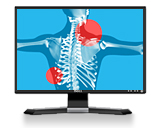 As the Acting Director of the National Institute of Arthritis and Musculoskeletal and Skin Diseases (NIAMS) of the National Institutes of Health, I am pleased to introduce The Burden of Musculoskeletal Diseases in the United States, fourth edition. The NIAMS appreciates the efforts of the U.S. Bone and Joint Initiative to use the best available data to quantify the individual and societal costs of musculoskeletal diseases.
As the Acting Director of the National Institute of Arthritis and Musculoskeletal and Skin Diseases (NIAMS) of the National Institutes of Health, I am pleased to introduce The Burden of Musculoskeletal Diseases in the United States, fourth edition. The NIAMS appreciates the efforts of the U.S. Bone and Joint Initiative to use the best available data to quantify the individual and societal costs of musculoskeletal diseases.
Since its establishment as the presidentially declared U.S. Bone and Joint Decade in 2002, the Initiative has been committed to preventing musculoskeletal disorders and improving patients’ lives. These goals, which the NIAMS shares, are being advanced through activities such as the production of this resource to raise awareness of the challenges bone and joint conditions place on our Nation’s health.
The fourth edition of The Burden of Musculoskeletal Diseases in the United States provides a snapshot of where we are today as well as historical trends. Clearly the human and economic costs continue to be great. Although each data point in this book reflects a person who is suffering, there is much to be hopeful about. Research is providing data that patients and their healthcare providers can use when deciding whether surgery for chronic low back pain is appropriate. We now know that diet and exercise combined are an effective treatment for osteoarthritis. Disease modifying drugs are saving countless rheumatoid arthritis patients from a lifetime of disability. Fracture liaison services are enabling patients with osteoporotic fractures to get appropriate treatment to reduce their risk of a second fracture. Schools are integrating evidence-based injury prevention activities into their athletic programs. And research into the many areas mentioned in this publication continues.
As you use these data to learn more about the personal and financial impact of these diseases, I encourage you to think beyond the bar graphs and numbers and to reflect on the promise the Initiative and its related efforts hold for the people on whom the data are based.
Robert H. Carter, MD
Acting Director
National Institute of Arthritis and Musculoskeletal and Skin Diseases
National Institutes of Health


